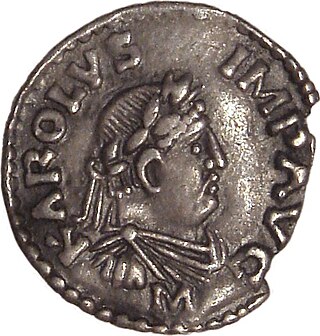
Charlemagne or Charles the Great, a member of the Carolingian dynasty, was King of the Franks from 768, King of the Lombards from 774, and the Emperor of the Romans from 800. Charlemagne succeeded in uniting the majority of western and central Europe and was the first recognized emperor to rule from western Europe after the fall of the Western Roman Empire around three centuries earlier. The expanded Frankish state that Charlemagne founded was the Carolingian Empire, which is considered the first phase in the history of the Holy Roman Empire. He was canonized by Antipope Paschal III—an act later treated as invalid—and he is now regarded by some as beatified in the Catholic Church.

Charles Martel was a Frankish political and military leader who, as Duke and Prince of the Franks and Mayor of the Palace, was the de facto ruler of Francia from 718 until his death. He was a son of the Frankish statesman Pepin of Herstal and Pepin's mistress, a noblewoman named Alpaida. Charles, also known as "The Hammer", successfully asserted his claims to power as successor to his father as the power behind the throne in Frankish politics. Continuing and building on his father's work, he restored centralized government in Francia and began the series of military campaigns that re-established the Franks as the undisputed masters of all Gaul. According to a near-contemporary source, the Liber Historiae Francorum, Charles was "a warrior who was uncommonly ... effective in battle".

In the history of Europe, the Middle Ages or medieval period lasted approximately from the late 5th to the late 15th centuries, similar to the post-classical period of global history. It began with the fall of the Western Roman Empire and transitioned into the Renaissance and the Age of Discovery. The Middle Ages is the middle period of the three traditional divisions of Western history: classical antiquity, the medieval period, and the modern period. The medieval period is itself subdivided into the Early, High, and Late Middle Ages.
The 730s decade ran from January 1, 730, to December 31, 739.
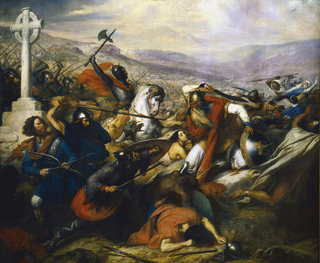
Year 732 (DCCXXXII) was a leap year starting on Tuesday of the Julian calendar. The denomination 732 for this year has been used since the early medieval period, when the Anno Domini calendar era became the prevalent method in Europe for naming years.
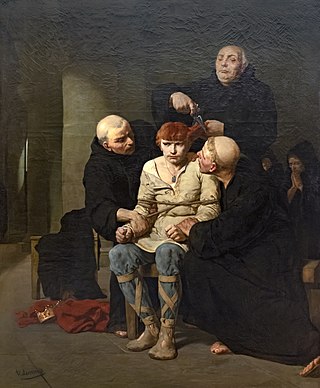
Year 737 (DCCXXXVII) was a common year starting on Tuesday of the Julian calendar. The denomination 737 for this year has been used since the early medieval period, when the Anno Domini calendar era became the prevalent method in Europe for naming.

The Battle of Tours, also called the Battle of Poitiers and the Battle of the Highway of the Martyrs, was fought on October 10, 732, and was an important battle during the Umayyad invasion of Gaul. It resulted in the victory for the Frankish and Aquitanian forces, led by Charles Martel, over the invading Muslim forces of the Umayyad Caliphate, led by Abd al-Rahman al-Ghafiqi, governor of al-Andalus. Several historians have credited the Christian victory in the battle as an important factor in curtailing the Islamization of Western Europe.
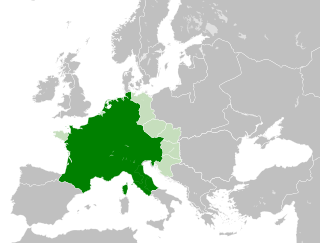
The Carolingian Empire (800–888) was a large Frankish-dominated empire in western and central Europe during the Early Middle Ages. It was ruled by the Carolingian dynasty, which had ruled as kings of the Franks since 751 and as kings of the Lombards in Italy from 774. In 800, the Frankish king Charlemagne was crowned emperor in Rome by Pope Leo III in an effort to transfer the Roman Empire from the Byzantine Empire to western Europe. The Carolingian Empire is considered the first phase in the history of the Holy Roman Empire.

Abd al-Rahman ibn Abd Allah Al-Ghafiqi, was an Arab Umayyad commander of the Andalusian Muslims that he unsuccessfully led into battle against the forces of Charles Martel in the Battle of Tours on October 10, 732 AD.

The Early Middle Ages, sometimes controversially referred to as the Dark Ages, is typically regarded by historians as lasting from the late 5th or early 6th century through the 10th century. They marked the start of the Middle Ages of European history, following the decline of the Western Roman Empire, and preceding the High Middle Ages. The alternative term late antiquity, for the early part of the period, emphasizes elements of continuity with the Roman Empire, while Early Middle Ages is used to emphasize developments characteristic of the earlier medieval period.
New Christian was a socio-religious designation and legal distinction in the Spanish Empire and the Portuguese Empire. The term was used from the 15th century onwards primarily to describe the descendants of the Sephardic Jews and Moors baptised into the Catholic Church following the Alhambra Decree. The Alhambra Decree of 1492, also known as the Edict of Expulsion, was an anti-Jewish law made by the Catholic Monarchs upon the Reconquista of the Iberian Peninsula. It required Jews to convert to Catholicism or be expelled from Spain. Most of the history of the "New Christians" refers to the Jewish converts, who were generally known as Conversos while the Muslim converts were known as Moriscos.
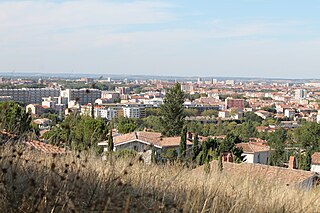
The Battle of Toulouse (721) was a victory of an Aquitanian Christian army led by Odo the Great, Duke of Aquitaine over an Umayyad Muslim army besieging the city of Toulouse, led by al-Samh ibn Malik al-Khawlani, the Umayyad wāli (governor-general) of al-Andalus. The decisive Aquitanian victory checked the spread of Umayyad control westward from Narbonne into Aquitaine.
Odo the Great, was the Duke of Aquitaine by 700. His territory included Vasconia in the south-west of Gaul and the Duchy of Aquitaine, a realm extending from the Loire to the Pyrenees, with the capital in Toulouse. He fought the Carolingian Franks and made alliances with the Moors to combat them. He retained this domain until 735. He is remembered for defeating the Umayyads in 721 in the Battle of Toulouse. He was the first to defeat them decisively in Western Europe. The feat earned him the epithet "the Great". He also played a crucial role in the Battle of Tours, working closely with Charles Martel, whose alliance he sought after the Umayyad invasion of what is now southern France in 732.

Luitpold, perhaps of the Huosi family or related to the Carolingian dynasty by Liutswind, mother of Emperor Arnulf of Carinthia, was the ancestor of the Luitpolding dynasty which ruled Bavaria and Carinthia until the mid-tenth century.

The siege of Avignon, in which Frankish forces led by Charles Martel beat the Umayyad garrison of Avignon and destroyed the stronghold, was contested in 737.
The siege of Narbonne was fought in 737 between the Arab and Berber Muslim forces of Yusuf ibn Abd al-Rahman al-Fihri, Arab Umayyad Muslim governor of Septimania on behalf of al-Andalus, and the Frankish Christian army led by the Carolingian king Charles Martel.
Burchard was the Duke of Thuringia from shortly after 892 until his death. He replaced Poppo as duke shortly after his appointment in 892, but the reasons for Poppo's leaving office are unknown. Burchard may have been a Swabian.

The Battle of Riade or Battle of Merseburg was fought between the troops of East Francia under King Henry I and the Magyars at an unidentified location in northern Thuringia along the river Unstrut on 15 March 933. The battle was precipitated by the decision of the Synod of Erfurt to stop paying an annual tribute to the Magyars in 932.

An infidel is a person who is accused of disbelief in the central tenets of one's own religion, such as members of another religion, or irreligious people.

The Umayyad invasion of Gaul occurred in two phases in 719 and 732 AD. Although the Umayyads secured control of Septimania, their incursions beyond this into the Loire and Rhône valleys failed. By 759 they had lost Septimania to the Christian Franks, but would return in the 10th century to establish Fraxinetum based in Provence.












